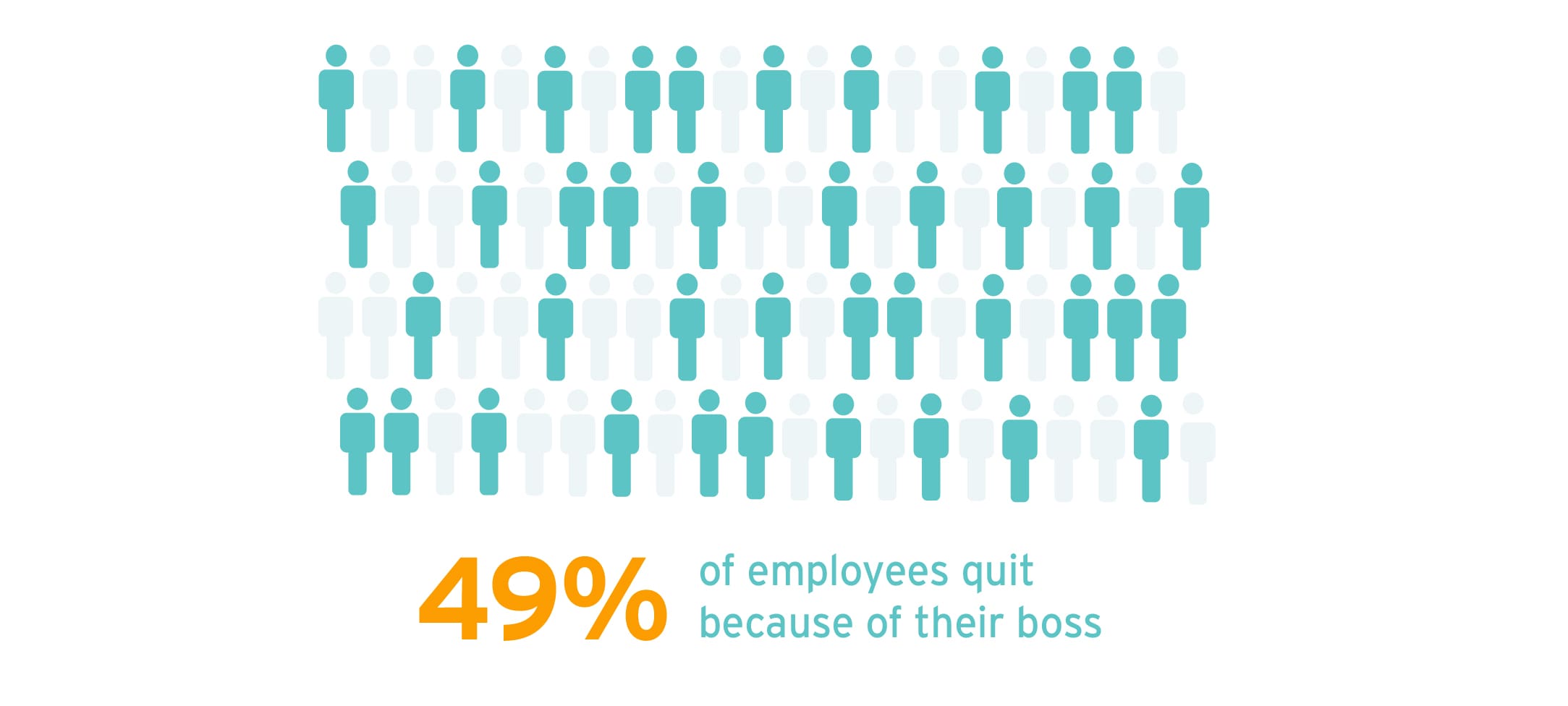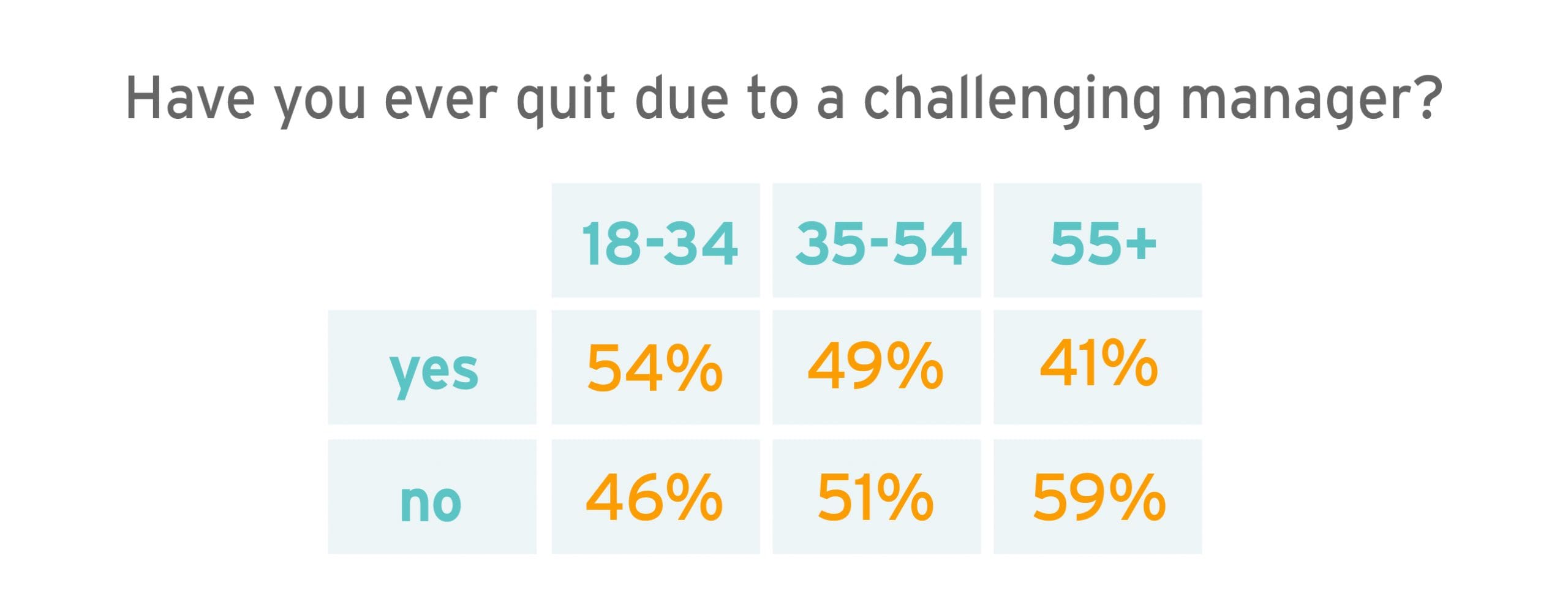The HR News Wire: 49 Percent of Employees Quit Because of Their Boss
December 13, 2019 by Josh Hrala
The HR News Wire is a weekly column that explores breaking HR news and research. This week, we look at a new study by the hiring firm Robert Half, which found that 49 percent of people polled quit their jobs because of their manager.
There’s a popular adage when it comes to employee quits: “People leave managers, not companies.” But for a long time, especially given just how much goes into the decision to quit a job, that adage has been questioned.
Basically, is it really that simple?
Now, though, a new study from Robert Half sheds a bit of light on the saying. In their findings, they report that nearly half of all quits – a whopping 49 percent – were because of managers.
This study also backs up other recent studies that have found that toxic work environments are a major reason for quits with most of those quitters blaming their managers directly for not controlling the environment properly. Another recent study also found that many, and we mean many, people cry often at work – mostly because of their boss.
In short, there seems to be something afoot when it comes to managers, which business leaders need to be concerned about. After all, if employers want their businesses to be attractive in the tight labor market, they need to firmly understand that managers of all levels wield an immense amount of power when it comes to the longevity of the workforce.
Let’s take a deeper look at the study.
The Study
Okay, so how did Robert Half come to these conclusions?
Simple: they worked with an independent research firm to poll 2,800 workers over the age of 18 who were employed in office environments in 28 different US cities.
They then asked these individuals why they quit their jobs. Then, they broke down that data into age ranges to see if different generations quit differently from one another.
In the end, they found that 49 percent of those asked have quit a job due to a “challenging manager.” 18 to 34 year olds – AKA Millennials – quit because of managers the most frequently with 54 percent. Gen X, people between the ages of 35 and 54, were second with 49 percent. Baby Boomers, people 55 and older, came in last with 41 percent.
Even Baby Boomers, who seem to put up with difficult managers more often and for far longer, have a significant quit rate due to this issue, which is quite surprising.
Millennials and Gen X are far more likely to quit than Baby Boomers, too, which isn’t all that surprising because both of these generations are more prone to job hopping, especially Millennials who view job hopping as one of the only ways to get ahead in their careers.
All in all, the data showcases a simple point: people really do leave their managers. However, I would argue that managers are a product of a company and, therefore, by passing blame on to managers, and not the organization, is just a way for the company to distance themselves.
That is an argument for a different time and place, but it makes logical sense. Upper level management and stakeholders need to be aware that managers are costing their companies a ton of money in the form of turnover and brand erosion. If they fail to act on this, especially based on all of the recent reports pointing to the issue, the organization, in itself, is to blame.
Changing gears here. The research also took an interesting, yet not as useful approach by looking into what cities were more prone to poor manager quits.
The team found that Minneapolis had the fewest, followed by Atlanta, and Philadelphia and Boston (these two tied for third). On the flip side, Sacramento came in first for the most quits, followed by Tampa and Miami (another tie for second), and Seattle and Charlotte (tied for third).
The team doesn’t give any sort of nod to why these details are all that important, but it’s interesting to see that huge cities like NYC, Chicago, and San Francisco ( an area filled with Millennials) didn’t make the list.
So What Can Be Done?
The real issue here is that managers need to be held more accountable. The team argues that most of these issues can be resolved if caught early. Things like training and relationship-strengthening activities may work to fix the issue before it leads to turnover.
“We’ve all heard horror stories about difficult managers — or experienced one firsthand,” said Paul McDonald, senior executive director for Robert Half. “Work styles and how well a person gets along with their supervisor can determine whether someone decides to join or remain at a company.”
“Many times open communication and training can help to resolve issues and strengthen the professional relationship between bosses and their direct reports. Employers should also commit to regularly gathering feedback on managers and developing the skills of new or potential leaders.”
Basically, organizations need to pay more attention to their managers. A simple way to do this is exit interviews. Typically, when a person quits on their own accord, they feel empowered to share their thoughts about the company, which can help HR and other leadership teams determine if there are any issue.
Plus, a study from last year found that exit interviews can save companies billions of dollars because they showcase flaws that need fixed before they devolve into full-blown retention issues.
The Takeaways
The real takeaway here is that managers are a driving factor when it comes to employee quits. This makes sense and backs up the age old saying that people quit their managers and not their companies.
While I argue that these two things are interchangeable because organizations are the ones responsible for mangers and their actions in the first place, this study helps reinforce a growing trend in today’s tight labor market: people are empowered now more than ever to leave their roles and find new ones.
This empowerment is really showing the world where company issues lie. Right now, those issues – despite all of this talk about employee engagement – lie with managers.
More from Careerminds
In need of outplacement assistance?
At Careerminds, we care about people first. That’s why we offer personalized talent management solutions for every level at lower costs, globally.





